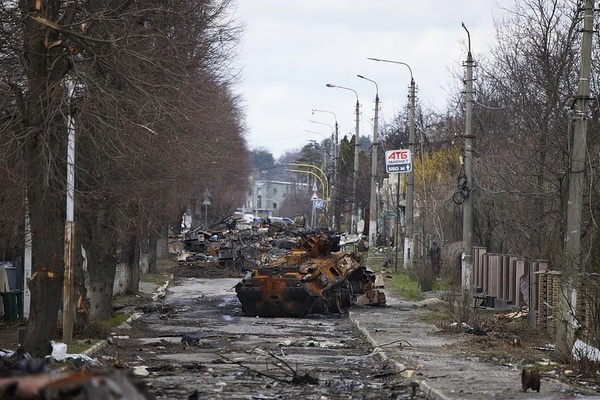
(function(d, s, id) { var js, fjs = d.getElementsByTagName(s)[0]; if (d.getElementById(id)) return; js = d.createElement(s); js.id = id; js.src = “https://connect.facebook.net/en_US/sdk.js#xfbml=1&version=v3.0”; fjs.parentNode.insertBefore(js, fjs); }(document, ‘script’, ‘facebook-jssdk’)); –>
–>
October 5, 2023
Last Thursday Sebastian Gorka hosted Mark Levin in the third hour of his show to discuss his new book. At 43:00 the discussion turned to Ukraine when Dr. Gorka said, “…Why is it so difficult for some on our side to realize what the war in Ukraine is about? …Why Putin is not on our side?” Mark Levin replied, “No. It’s shocking to me… particularly if you believe in America first…” I then followed the discussion hoping to hear why it is in America’s best interest to not only support Ukraine but to shovel billions of dollars to the country which includes paying salaries of thousands of Ukrainians even if the U.S. government was shut down. It occurred to me that I yet to hear a compelling argument for why support for Ukraine is in America’s interest.
‘); googletag.cmd.push(function () { googletag.display(‘div-gpt-ad-1609268089992-0’); }); document.write(”); googletag.cmd.push(function() { googletag.pubads().addEventListener(‘slotRenderEnded’, function(event) { if (event.slot.getSlotElementId() == “div-hre-Americanthinker—New-3028”) { googletag.display(“div-hre-Americanthinker—New-3028”); } }); }); }
On 24 February 2022, Russia invaded Ukraine in an escalation of the Russo-Ukrainian War that began in 2014. The invasion was provoked by the Biden Administration through the failed Afghanistan exit, the curtailing of oil and gas development that put Russia in an excellent position to invade, and Biden’s addleheaded “minor incursion” remark. But the real culprit was the inexorable drive by the U.S. and NATO to expand toward Russia. The final straw was the State Department’s signing of the U.S.-Ukraine Charter on Strategic Partnership on November 10, 2021. This document included the following provocative statement:
Emphasize unwavering commitment to Ukraine’s sovereignty, independence, and territorial integrity within its internationally recognized borders, including Crimea and extending to its territorial waters in the face of ongoing Russian aggression, which threatens regional peace and stability and undermines the global rules-based order.
Let’s take a look at where the conflict stands now. After spending $113 Billion in Ukraine, the war is at a stalemate. That amount is more than double Russia’s 2023 military expenditure. Back in early 2022, NATO officials see a continued stalemate. “The reality is that neither side has a superiority over the other,” the top NATO official said, adding neither side will back down. Finally over a year later, U.S. Intelligence (and I use that term loosely) agreed with that assessment. Ukraine casualties up to September of this year include 9614 dead, 534 of them children and 17,535 injured, 1180 of them children.
‘); googletag.cmd.push(function () { googletag.display(‘div-gpt-ad-1609270365559-0’); }); document.write(”); googletag.cmd.push(function() { googletag.pubads().addEventListener(‘slotRenderEnded’, function(event) { if (event.slot.getSlotElementId() == “div-hre-Americanthinker—New-3035”) { googletag.display(“div-hre-Americanthinker—New-3035”); } }); }); }
At the same time, the U.S. is running low on weapons that have been delivered to Ukraine. Pentagon comptroller Michael McCord told House and Senate leaders there is $1.6 billion left of the $25.9 billion Congress provided to replenish U.S. military stocks that have been flowing to Ukraine. Instead of valuing the equipment at replacement cost as was originally executed, the Pentagon change the valuation method to book value, which devalued the equipment by $6.2 billion. This is accounting shenanigans to allow the administration to provide more equipment to Ukraine that they are not going to replace. The U.S. sent Ukraine about $44 billion in equipment so far. In case you were wondering. 25.9 is less than 44. The same is true for the rest of NATO countries. Rob Bauer, NATO’s top military official, said that The steady flow of western military aid to Ukraine over the past 18 months has left ammunition stockpiles near the “bottom of the barrel.”
 Are the sanctions damaging Russia? Contrary to earlier American claims that economic sanctions would reduce Russia’s economic output by half, Russia’s GDP shrank by only 4 percent in 2022. Russia’s exports to China rose to $190 billion in 2022 from $86 billion in 2021, and exports to India reportedly doubled to $27 billion in 2022 from $13 billion in 2021, although the true total probably is higher. Russian fertilizer revenues rose by 70% in 2022 vs. 2021 despite a 10% drop in volume. Instead, Russia is making new friends around the world. Russia is discussing a Free Trade Agreement with India, whose Russian oil imports have quadrupled over the past year. Russia also signed an oil and gas deal with China. Sanctions never work and Russia is proof of that. In fact it has backfired gloriously as Germany declared a natural gas shortage after banning Russian imports. The German economy is now on its back.
Are the sanctions damaging Russia? Contrary to earlier American claims that economic sanctions would reduce Russia’s economic output by half, Russia’s GDP shrank by only 4 percent in 2022. Russia’s exports to China rose to $190 billion in 2022 from $86 billion in 2021, and exports to India reportedly doubled to $27 billion in 2022 from $13 billion in 2021, although the true total probably is higher. Russian fertilizer revenues rose by 70% in 2022 vs. 2021 despite a 10% drop in volume. Instead, Russia is making new friends around the world. Russia is discussing a Free Trade Agreement with India, whose Russian oil imports have quadrupled over the past year. Russia also signed an oil and gas deal with China. Sanctions never work and Russia is proof of that. In fact it has backfired gloriously as Germany declared a natural gas shortage after banning Russian imports. The German economy is now on its back.
What is the key U.S. strategic interest in supporting Ukraine? I have yet to see one. The Biden administration and other proponents of current U.S. policy have so far failed to offer a valid strategic argument on behalf of the costs and risks that current U.S. policy incurs in the Russia-Ukraine War.
One of the arguments is that if Russia succeeds in Ukraine, they will continue to march through NATO countries. First, I must refer you to my stalemate paragraph above. But let’s say they are able to finish off Ukraine. Then what? NATO countries spend nearly $1 trillion on defense versus Russia’s $48 billion. That is a factor of 20:1. Even the feckless Jake Sullivan warned of a full-fledged NATO response if a Russian strike were to hit member-state Poland. “If there is a military attack on NATO territory it would cause the invocation of Article 5, and we would bring the full force of the NATO alliance to bear in responding to it,” Sullivan said in an interview on CBS News’ “Face the Nation.” Russia is highly unlikely to launch an attack on any NATO country.
The second argument is if Russia does not pay a heavy price for its actions, it will send a message to other would-be aggressors that they too can seize territory and subjugate other countries. That argument went down the drain when the U.S. exited Afghanistan.
Finally, United States has an abiding interest in Ukraine because it affects the so-called “liberal international order.” As Secretary of State Antony Blinken asserts, “the international rules-based order that’s critical to maintaining peace and security is being put to the test by Russia’s unprovoked and unjustified invasion of Ukraine.” Yes, this is State Department mumbo jumbo to describe how they want to feel important in the world.
‘); googletag.cmd.push(function () { googletag.display(‘div-gpt-ad-1609268078422-0’); }); document.write(”); googletag.cmd.push(function() { googletag.pubads().addEventListener(‘slotRenderEnded’, function(event) { if (event.slot.getSlotElementId() == “div-hre-Americanthinker—New-3027”) { googletag.display(“div-hre-Americanthinker—New-3027”); } }); }); } if (publir_show_ads) { document.write(“
The truth is that none of the avowed U.S. interests in Ukraine stand up to scrutiny.
So what is this all about? Just follow the money. The amount of lobbying money spent by Ukraine and others is tremendous, impacting almost all the politicians. Everyone is getting in on it. Consulting firms linked to the White House’s leading Ukraine policy architects — including Secretary of State Antony Blinken and Deputy Secretary of State Victoria Nuland — appear to be advising the Ukrainian government on its reconstruction efforts funded by U.S. taxpayers. Defense contractor lobbyists are lobbying on behalf of Ukraine for free while taking millions from contractors that benefit from the war.
The war is not in America’s interest. It is in the interest of the neocon warhawks like Lindsey Graham and Roger Wicker who want to keep the world in conflict at all times. It is in the interest of lobbyists who are making millions off of this war. It is in the interest of defense contractors who make money off this war. It is in the interest of China, which waits in the wings for Russia to crawl to China on its knees, begging for more help.
In whose interest is this war not? You.
Image: RawPixel.com
<!–
–>
<!– if(page_width_onload <= 479) { document.write("
“); googletag.cmd.push(function() { googletag.display(‘div-gpt-ad-1345489840937-4’); }); } –> If you experience technical problems, please write to [email protected]
FOLLOW US ON
<!–
–>
<!– _qoptions={ qacct:”p-9bKF-NgTuSFM6″ }; ![]() –> <!—-> <!– var addthis_share = { email_template: “new_template” } –>
–> <!—-> <!– var addthis_share = { email_template: “new_template” } –>





